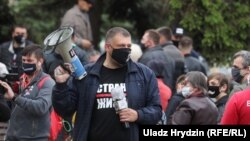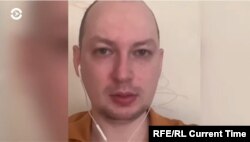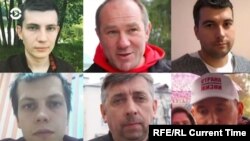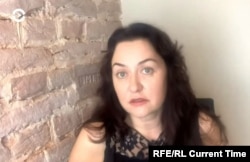Belarus’ longtime leader, President Alyaksandr Lukashenka, 65, describes himself as “not too wrapped up in this Internet,” but when it comes to confronting Lukashenka’s critics ahead of the country’s August 9 presidential election, the Belarusian government increasingly is taking its fight online.
Since signature drives for potential presidential candidates began in June, at least eight Belarusian bloggers have been detained on various charges, ranging from supposedly demeaning officials to disobeying the authorities. Two others have simply left the country.
Belarusian bloggers interviewed by Current Time attribute this trend not only to the upcoming presidential vote – President Lukashenka’s sixth election bid since 1994 – but to the growing popularity of channels on YouTube and Telegram that, unlike most major Belarusian media outlets, distribute content critical of the government.
“A blogger has ceased to be – both for the authorities and, it’s possible, for society – just a person who produces content,” commented Eduard Palchis, who runs current-affairs-commentary channels on both YouTube and the Telegram messaging app.
A blogger “is already an activist, a leader; this is already partly a politician,” continued Palchis, who faces potential jail time for filming presidential-campaign signature drives. “And they represent a bigger threat than classic [political] parties, politicians, activists. That’s exactly why they’re getting hit like this.”
Most of Belarus’ traditional news outlets – television, national newspapers, and radio – are controlled by the government. It also controls the country’s Internet backbone and can block sites or social-media groups deemed “extremist” at will.
Yet with the Internet now available to nearly 80 percent of Belarus’ population of 9.5 million, some independent social-media bloggers – the term used in Belarus for both vloggers and text bloggers – have subscription bases that easily outstrip those of state-run media.
Jailed vlogger Syarhey Tsikhanouski’s Strana Dlya Zhizni (A Country For Life) YouTube channel has registered 243,000 subscribers -- more than 12 times the number registered for the government’s Belarus 24 satellite channel. Similarly, NEXTA, which uses video and text to deliver tongue-in-cheek coverage of “Belarusian realities,” has over 122 times as many Telegram subscribers (333,162) as the state-run TV channel ONT.
“For the first time … we are seeing the impact of social media, which spreads information rapidly and is hard for the government to stifle,” David Marples, president of the North American Association of Belarusian Studies, commented to Emerging Europe, a site that covers formerly communist-ruled areas of Europe.
Social media's influence “suggests that the president is losing some support and authority, but he still has the means to ensure he is re-elected this time,” Marples, a history professor at the University of Alberta, added.
That appears to be precisely what concerns the Lukashenka administration.
In recent months, amidst signature campaigns for potential presidential candidates, Lukashenka, who has never lost an election, according to official data, has faced mounting criticism for his offhand approach to the coronavirus pandemic and a stagnating economy, among other issues.
At a July 9 meeting between Lukashenka and employees of mainstream Belarusian media outlets, Information Minister Igor Lutsky asserted that, during the election campaign, the government has been in “a sharp information conflict with opponents and open enemies of the Belarusian state.”
In late June, Belarusian Interior Minister Yury Karayeu alleged to parliament that “very well organized” people want to set off a “street revolution” in Belarus via certain undefined Telegram channels and Radio Free Europe/Radio Liberty’s Belarusian-language livestream. (Current Time is led by RFE/RL in cooperation with the Voice of America.)
Since May, the government has detained some eight YouTube and Telegram bloggers who advocate or disseminate views critical of Lukashenka’s policies:
- Syarhey Tsikhanouski, a would-be presidential candidate and the host of Strana Dlya Zhizni, was detained on May 29 in the western city of Hrodna after an unidentified woman complained to police at a signature-campaign drive that he would not answer her questions. Tsikhanouski and seven others were charged under Article 342 of Belarus’ Criminal Code with organizing an event to majorly disrupt public order – an apparent reference to public signature drives for potential presidential election candidates. Along with the other bloggers charged under Article 342, he faces a potential three years in prison.
Although election officials declined to register Tsikhanouski’s own candidacy, they have not yet decided about that of his wife, Svetlana. - Dmitry Kozlov, a political activist and supporter of Tsikhanouski, was detained on June 10 during a demonstration and faces the same charges as Tsikhanouski. His Seryi Kot (Gray Cat) YouTube channel has 18,600 subscribers.
- Uladzimir Tsyganovich, another outspoken critic of the Lukashenka government, also faces charges under the Criminal Code’s Article 342. His MozgON (BrainON) YouTube and Telegram channels have over 82,100 subscribers.
- Alyaksandr Kabanau and Syarhey Petrukhin – The two Brest bloggers, detained on June 15 for activities supposedly defying the authorities’ “legal requirements,” run the political-commentary YouTube channel Narodnyi Reporter, which has 51,100 subscribers.
. - Vladimir Neronski, a political-social-issues blogger from the central city of Slutsk and creator of the roughly 13,000-member YouTube channel Slutsk Dlya Zhizni (Slutsk For Life), was detained on June 25 for allegedly demeaning the “honor and dignity” of officials, a criminal offense.
- Ihor Losik, whose Belarus Golovnogo Mozga (Belarus Brain) Telegram channel has 172,823 followers, was detained on June 25 and also charged under Article 342.
- Alyaksandr Andreyev, a Telegram blogger who focuses on social issues in his eastern city of Orsha, not far from the Russian border, was detained on June 26 during a candidate-signature-drive rally for an unidentified “administrative offense.”
Losik’s wife, Darya, has charged that “The government reacts like this to bloggers and Telegram channels because it’s afraid that the country’s population is becoming more informed about what’s going on in the country right now.”
But Lukashenka, known for his denunciations of alleged false online news, is now seeking to downplay the influence of any bloggers.
“I’m not too wrapped up in this Internet,” he shared at the July 9 gathering with Belarus’ main, state-run media outlets. “But, very often, they (officials) report to me about those people who hype [things] and post …”
“[A]nd when they give me last names, I start to scratch my head and also to think: ‘Who are these people?’”
Local rights activists have condemned the blogger detentions as politically motivated and violations of the right to free speech.
The European Union and United States also have expressed concern, with the EU terming the charges against Tsikhanouski “baseless” and urging his release.
Radio Free Europe/Radio Liberty has also demanded the release of Losik, a digital-technologies consultant for the U.S. media organization’s Belarusian Service.
"Blogging is not a crime,” commented RFE/RL Acting President Daisy Sindelar. “We demand that [Losik] be released immediately, that any confiscated materials and equipment be returned to him immediately, and that Belarus officials stop persecuting the people who are doing the essential work of keeping the public informed about developments related to the country’s forthcoming presidential elections.”
RFE/RL defines its mission as providing balanced, “independent journalism that promotes democratic values and human rights and combats all forms of intolerance.”
The Belarusian Foreign Ministry does not appear to have responded publicly to these statements. The international community has never recognized any of Belarus' national elections as free and fair.
Belarusian human-rights activists estimate that at least 703 people have been detained for various reasons as presidential campaigning begins. Among them are the man who was expected to be Lukashenka’s chief rival in the presidential race, 56-year-old banker Viktor Babaryko, and his son, Eduard, for alleged financial crimes.
Against this backdrop, two Belarusian bloggers have opted within the past month to leave the country altogether because, they say, they do not sense that their right to freedom of speech is protected.
Tatiana Martynova, a bar owner and former radio anchor, fled with her daughter to Ukraine on July 1 after a source in the Belarusian security services tipped her off that the police were planning to detain her. Martynova runs a 31,100-member Facebook group called Khvatit Boyatsya (Stop Being Afraid) that mobilizes supporters of reform.
After a series of police searches, Syarhey Byaspalau, the administrator of the Telegram channel Maya Kraina Belarus (My Country Is Belarus) also left the country to escape potential detention.
“As you see, complete bedlam is going on in the country. They’re imprisoning bloggers, bringing criminal cases against them, but this is all just a game,” said Byaspalau, speaking remotely from an undisclosed location to the Telegram channel Usy Lukashenko (Lukashenko's Ears). “I don’t want to live in such a country, where they can grab you for some made-up case and shut you up [in prison] for half a year.”
Hoping for change, he says that he plans to return for the August 9 elections.
President Lukashenka has one change in mind: Government-run media should be reinforced as the "main factor" in Belarus' media market, he stated at his July 9 media meeting, the official Belta news agency reported.
Information Minister Lutsky, for his part, is focusing on television, still believed to be the most popular medium among Belarusians for news and information.
As part of a state media strategy, government-financed TV should become “an institute for the discussion and resolution of social problems,” he told attendees at the July 9 meeting with President Lukashenka.
The minister's proposals range from scrapping broadcasts of weddings, lottery drawings, and corporate events to adding talk shows and journalist investigations that “discuss problems that worry people.”
Little sign, though, exists that social-media bloggers expect any change from this corner.
State-run outlets “have nothing that people would read in an independent, competitive environment” for media, blogger Palchis commented earlier. “Therefore, they’re enraged by those people whose agenda, line of coverage, isn’t shaped by them.”
President Lukashenka, however, told his July 9 audience of mostly state-employed journalists that he himself welcomes divergent views -- at least, among them.
His office, he added, now requires that opposing points of view be included in the preparations for "any" event.
“Absolutely, an alternative; absolutely, a competition, a clash of opinions, a brain attack,” Lukashenka said. “This is all correct.”
-With information from Belsat, the Committee to Protect Journalists, TUT.by, and Viasna








